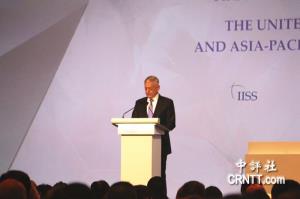Dr John Chipman, Director-General and Chief Executive, IISS
Thank you very much. I will take a quick round. Please keep your questions crisp.
Lieutenant General (Retd) Parmendra Kumar Singh, Director, United Service Institution of India
We have been hearing, not just from this session, but earlier we talked about rule-based laws being followed. But I do not think China is going to pull back its militarisation from those islands, nor is North Korea going to denuclearise. Are we going to lay down a timeline, or are we going to keep repeating this over the years for the next decade or more? Thank you.
Richard Lloyd Parry, Asia Editor, The Times
Mr Mattis, you made it clear that the US does not seek regime change in North Korea. So the very simple yes/no question is this: does the North Korean government of Kim Jong-un have a right to exist?
Professor Kishore Mahbubani, Dean and Professor, Practice of Public Policy, Lee Kuan Yew School of Public Policy, National University of Singapore
Thank you, Secretary Mattis, for your speech. You said that US-China competition will rise. It will probably rise more acutely in the economic arena. China has launched a Belt and Road Initiative; the US has withdrawn from TPP. Is there any possibility at all of the US reconsidering its decision to withdraw from TPP? Because that would be a powerful signal to this region.
Ekaterina Koldunova, Deputy Dean, School of Political Affairs, Moscow State Institute of International Relations
Secretary Mattis, you mentioned rules-based order several times. My understanding is that it can be ensured only through the institutions, but at the same time, we have heard multiple questions about growing unilateralism in the US foreign policy – I will not repeat them. My question is, what will be the role and function of the regional security institutions if this tendency really exists and will go on? How could we ensure the ASEAN centrality, for example, in these settings? Thank you.
Professor Christopher Roberts, Director, National Asian Security Studies Program, School of Humanities and Social Sciences, UNSW Canberra, Australian Defence Force Academy
Some might argue that China has already largely achieved its goals in the South China Sea. Given my own discussions in Manila and beyond, US relations with President Duterte and President Duterte’s stand over the South China Sea might be improved as the US provides a continuous security presence around features such as the Scarborough Shoal, perhaps even via coalition of coastguards, including Australia, and an unconditional guarantee to protect the legally declared exclusive economic zone (EEZ) of the Philippines. Can the US take such steps, in addition to what you have already indicated, to put an immediate halt to the expansion of China’s presence within the EEZ or the Philippines? Could something similar be done in the case of Vietnam and perhaps Malaysia? Thank you.
|

